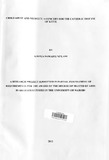| dc.description.abstract | This study investigated the role of the church in addressing child abuse and neglect in Kitui. It was based on three objectives. The first one was to examine the Biblical teachings and African Traditional understanding of the importance of children and compare with the contemporary society. The second objective was to investigate the factors contributing to child abuse and neglect and their effects to the children in Kitui and the third analyzed the participation of the church in the protection of children from abuse and neglect.
The study used stratified, purposive and systematic sampling methods. Both primary and secondary sources of data were used. Primary data was obtained from interviews, questionnaires and focus group discussions while secondary data was obtained from library sources, internet and Catholic Diocese of Kitui programme reports in the Department of Child Welfare. The study was guided by three theories; psychoanalysis theory developed by Sigmund Freud, which explained the irresponsible behaviour of perpetrators of child abuse and neglect; Social Learning theory by Albert Bandura, which explained the effects of exposing children to abuse and neglect; and Structural Functionalism theory developed by Emile Durkheim, which explained that the church has a role to play in protecting children from abuse and neglect.
Three hypotheses were advanced for the study. First, in the African traditional Society and in Biblical world, children were protected from abuse and neglect. Second, irresponsible behavior of parents and Guardians accelerates the problem of child abuse and neglect. And third, the Church participates actively in addressing child abuse and neglect in the society. The first hypothesis was confirmed as it was discovered that the traditional African society valued children as they belonged to the community which participated in their upbringing until they were initiated into adulthood. Thus, the community protected children from abuse. The Bible also portrayed children as important as evidenced by the misery that the barren women underwent as they were despised by their fellow women for not having children. Children were treasured as they prolonged family lineage. In the New Testament, Jesus valued children and welcomed them to his company, blessed, protected, and healed them.
The second hypothesis was also confirmed as individual factors and especially, drug and substance abuse, and poor parenting skills, were rated highest in contributing to abuse and. neglect. Other factors included; family, social and cultural factors. Finally, the third hypothesis was also confirmed as the church was found to be actively engaged in different programmes that protect children from abuse and neglect. These included; Child Labour, Child Safety and Protection, Rehabilitation, Sponsorship, and Orphans and Vulnerable Children programmes.
The study made some recommendations based on the findings of the study which included; strengthening of the referral systems and networking, improved ways of creating awareness, training on parenting skills, and adoption of child protection measures by all churches in Kitui. Since all the programmes were having a concern for education, a research suggestion was given to investigate the role of the Catholic Diocese of Kitui in raising the literacy level in Kitui. | en_US |

